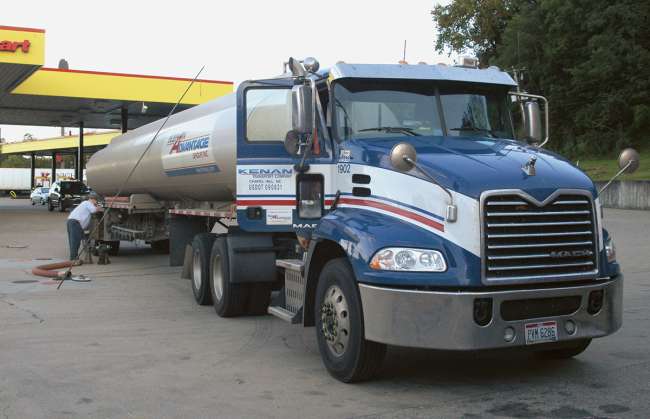More Fleets Boost Driver Pay as Freight-Hauling Capacity Tightens

Increased demand for freight hauling is putting more pressure on motor carriers to raise compensation for drivers.
Kenan Advantage Group, the nation’s largest petroleum hauler, said it will ask its customers to support a program that provides guaranteed raises over the next three years as a way ensure the company has enough drivers to meet demand for service.
“It is important that we boldly assume the responsibility of protecting our customers from the painful impacts of the driver shortages,” Dennis Nash, CEO of the Canton, Ohio-based tank truck carrier group, said in a Sept. 27 statement. “A potential tsunami is building now that presents serious consequences if not addressed.”
KAG ranks No. 25 on the Transport Topics Top 100 list of largest for-hire carriers in North America with revenue of $1.4 billion in 2016. The company delivers fuel, chemicals, food-grade bulk commodities and industrial gases in the United States and Canada. It operates more than 5,200 company-owned and lease-to-own tractors and 1,570 tractors supplies by independent owner-operators.
A similar program providing a weekly minimum pay guarantee of $1,000 to drivers was announced Sept. 22 by Hornady Transportation, a flatbed/heavy specialized carrier based in Monroeville, Ala.
“Drivers are the heart and soul of our company,” Hornady Transportation CEO Chris Hornady said. “They make sacrifices by being away from home and loved ones. The guarantee gives them assurances of being paid, even if they’re not driving due to customer delays, congestion, operations and market conditions.”

Hornady Transportation drivers are now receiving a weekly minimum pay guarantee of $1,000. (TruckPR\Flickr)
The program will protect drivers from issues they have no control over, Hornady explained.
Hornady operates a fleet of 270 trucks and 375 flatbed trailers and hauls building products, steel and other structural products.
To lure more drivers, Hornady said the company offers a $2,500 sign-on bonus and has boosted orientation pay to $1,000, plus it offers bonuses for driver and customer referrals.
Hornady is part of Daseke Inc., a company based in Addison, Texas, that operates more than a dozen carriers in the United States and Canada. Daseke ranks No. 41 on the TT100 for-hire list and is the second-largest carrier in the flatbed/heavy specialized sector with combined revenue of $770 million in 2016.
Epes Transport System, a dry van truckload carrier based in Greensboro, N.C., announced plans to boost compensation by more than $1 million for its drivers this year.
“This spring, we improved our independent contractor pay package which has led to sustained growth,” said Phil Peck, vice president of operations for Epes. Contractor pay is now based on a percentage of the value of the load rather than mileage.
Company drivers received an increase of 2 cents per mile, Peck said.
“We appreciate and recognize their professionalism, dedication and hard work,” Peck said in a Sept. 27 statement. “So, we want to support our drivers with modern equipment, desirable freight and quality of life for them and their families.”
Epes Carriers Inc. ranks No. 81 on the TT100 for-hire list with revenue of $332.1 million in 2016. Epes Transport System ranks No. 35 on the list of largest carriers in the truckload/dedicated sector.
A&R Logistics is giving company drivers a pay increase effective Oct. 1, giving drivers the ability to earn up to 10% more per loaded mile, according to Steve Brantley Sr., vice president of terminal operations for the Louisville, Ky.-based carrier.
In addition, the company has changed its vacation policy to give drivers more time at home.
“We have more opportunities for qualified drivers and want to make sure we retain our current drivers,” Brantley said in describing the changes. “We are also launching efforts to upgrade and modernize our fleet to provide drivers the best equipment possible.”
Bruce Blaise, president of Kenan Advantage Group, said carriers are facing a critical shortage of drivers because of a number of factors, including a federal mandate to use electronic logging devices to monitor driver hours of service, an economy that is near full employment and an aging workforce in which as many as 25% of current drivers are expected to retire over the next five years.
“The perfect storm is upon us,” Blaise said. “We simply have to make the adjustments needed to attract new drivers to our company and industry.”




